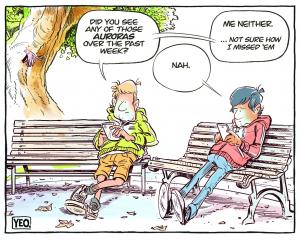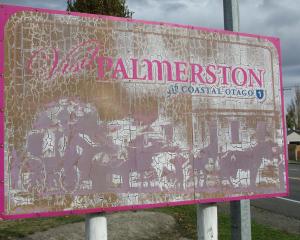
The accused was led down the long steps to the cells below the High Court as the jurors slunk into the jury room to ponder their verdict in the case of the Crown versus Tony Veitch.
Justice Irate had just finished a tedious summing up and it was going to be a long, hard deliberation.
A pre-trial change of venue order had shifted the hearing from Auckland to Dunedin because no Aucklander could be found who did not well know either the accused or the complainant.
"Wounding with intent to cause grievous bodily harm! It's as clear as the wart on my nose," chimed up Lily Militant, the most vociferous of jurors.
It soon became apparent that Ms Militant was a women's refuge past president who had slipped under the defence's radar during jury selection.
"Kristin said he did it. He's as much has admitted it. The apology did that! Guilty as sin! Let's go home!" she ranted.
"Hang on," said Norman the foreman.
"It isn't as easy as that. Why even have juries if they cannot consider wider issues of justice?"
"Yeah. There's a lot more to this than meets the eye!" piped up several other jurors in unison.
Johnny, the butcher's apprentice, said he was hungry and asked whether morning tea was provided.
Norman the foreman took over at the top of the jury table, telling everyone to sit down and get out their note pads.
"There are three charges, or counts, as the judge said, but they are all in the alternative and we only pick one. They are all under the Crimes Act 1961. Which one? The most serious is wounding with intent to cause grievous bodily harm under section 188 and that carries up to 14 years' imprisonment"
The next is assault with intent to injure under section 194 [three years] and finally there is simple assault of a female under section 194 and that carries up to two years' imprisonment."
"I vote for Guilty! Guilty! Guilty! on the 14-year one," shrilled Lily.
"And that's still not enough!" Her mind was made up.
Sonia, the checkout worker from Pak'nSave, along with Ron from the local council, and Dave the hospital orderly, all took an opposite view.
"We know he hit her, but was it with intent to injure or cause grievous bodily harm?" they argued in different words.
"Maybe it's just straight assault?" Mary the working mum, Doug the engineer, teacher Bill and Norman the foreman all argued that the middle charge of assault with intent to injure was the more obvious charge. Lily sniffed her total disagreement and Johnny asked if they would be given lunch, and when, and for how long.
But then up spoke Marian the librarian and softly laid out in measured tones what all of them, except Lily, had been thinking.
"Of course I'm disgusted at domestic violence. It was appalling what happened, and she was injured. In normal circumstances, I would be with Lily. But here we have a victim who sought initial police advice, then had experienced lawyers broker a deal which gave her $150,000 for the matter to remain under wraps. I can't in all conscience allow her to blow hot and cold."
"But," said Norman the foreman,
"the judge told us that any such deal was irrelevant and that once the matter was before the court there was no option but to hear her evidence."
"But that's unfair," exploded Nathan, a young plasterer from Mosgiel.
"What? And she gets to keep the 150 grand! I don't care what the judge said. That's not decent. It's our job to say what's fair and unfair. Didn't the judge say something about us representing the standards of the community?"
"Reminds me of the story from way back," said Fitz, a retired green keeper.
"Three local magistrates were at a seminar on drink-driving and were asked what decision they would make where a drunk driver was breathalysed and was over the limit but before being taken down to the station the bloody cop told him to move his car by doing a U-turn and parking it in a safer place 50m away. The first magistrate said he would deal with him in the usual way with a fine and disqualification.
"The second magistrate, J.D. Murray, said he would convict and discharge the bloke to show the court's disapproval at the constable allowing the driver to shift the car after a positive breath test. The third magistrate, Mr T.A. Ross, said he would dismiss the charge outright because the police could not blow hot and cold over the driving standard exercised. Either it was OK, or it was not OK. That's the case here isn't it?"
"I see your point," said the foreman.
"This witness, call her the victim if you wish, Lily, decided not to lay a complaint at the time it ought to have been made, and chose to accept, indeed broker, a payment of $150,000 to keep the matter quiet. Should we now let her go back on that agreement?"
"No," spoke up the majority.
"I'm a bit mixed up," said one.
"I don't like letting him off. He was clearly in the wrong. She has no blame at all, but it's obscene to take $150,000 in return for the matter being resolved but now to complain and for the prosecution to seek a guilty verdict and send him to prison. Give her tea and sympathy, but no more!"
"Did someone say tea?" Johnny asked, and added,
"and maybe some biscuits?" Lily snorted in defiance but knew that the new Criminal Procedure Act allowed for a majority verdict of 11 to 1, and the four hours for that rule to click into place had passed.
At 4.22 pm, the jury returned to the court room.
The accused trudged up the steps from the dungeon and the judge entered from behind the ruby curtains on to his high seat.
Ladies and gentlemen of the jury, asked the registrar.
"How say you? Do you find the accused guilty or not guilty?" "Not guilty," mumbled Norman the foreman in a quiet voice.
- Michael Guest is a former lawyer and District and Family Court Judge












